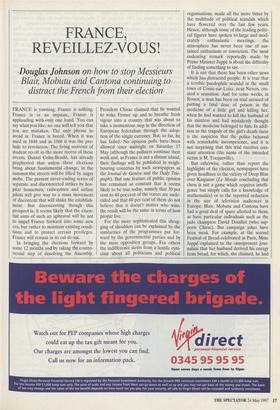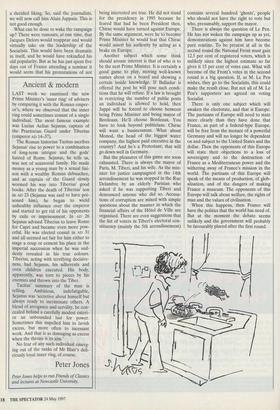FRANCE, REVEILLEZ-VOUS!
Douglas Johnson on how to stop Messieurs Blab; Mobutu and Cantona continuing to distract the French from their election FRANCE is yawning, France is sulking, France is in an impasse,. France is applauding with only one hand. You can say what you like, no one will tell you that you are mistaken. The only phrase to avoid is: France is bored. When it was used in 1848 and in 1968 it was the pre- lude to revolution. The living souvenir of student revolt in the more recent of these events, Daniel Cohn-Bendit, has already prophesied that unless these elections bring about fundamental change, in the summer the streets will be filled by angry mobs. The present never-ending series of separate and disconnected strikes by hos- pital housemen, railwaymen and airline pilots will give way to a mass movement of discontent that will shake the establish- ment. But disconcerting though this prospect is, it seems likely that the essen- tial aims of such an upheaval will be not to impel France forward into some new era, but rather to maintain existing condi- tions and to protect certain privileges. France will remain in its cul-de-sac.
In bringing the elections forward by some 12 months and by taking the contro- versial step of dissolving the Assembly, President Chirac claimed that he wanted to wake France up and to breathe fresh vigour into a country that was about to take a momentous step in the direction of European federalism through the adop- tion of the single currency. But, so far, he has failed. No opinion polls have been allowed since midnight on Saturday 17 May (although the pollsters continue their work and, as France is not a distant island, their findings will be published in neigh- bouring countries by such newspapers as the Journal de Geneve and the Daily Tele- graph). But one feature of public opinion has remained so constant that it seems likely to be true today, namely that 30 per cent to 40 per cent of the voters are unde- cided and that 60 per cent of them do not believe that it doesn't matter who wins, the result will be the same in terms of how people live. For the more sophisticated this shrug- ging of shoulders can be explained by the similarities of the programmes put for- ward by the governmental parties and by the main opposition groups. For others the indifference sterns from a hostile cyni- cism about all politicians and political organisations, made all the more bitter by the multitude of political scandals which have flowered over the last few years. Hence, although some of the leading politi- cal figures have spoken to large and mod- erately enthusiastic meetings, the atmosphere has never been one of sus- tained enthusiasm or conviction. The most endearing remark reportedly made by Prime Minister Juppe is about the difficulty of finding something to say.
It is not that there has been other news which has distracted people. It is true that a terrible paedophile scandal in the small town of Cosne-sur-Loire, near Nevers, cre- ated a sensation. And for some weeks, in Rouen, a man has been on trial accused of putting a fatal dose of poison in the medicine of a little girl and killing her, when he had wanted to kill the husband of his mistress and had mistakenly thought that the medicine belonged to him. In addi- tion to the tragedy of the girl's death there is the suspicion that the police behaved with remarkable incompetence, and it is not surprising that this trial receives con- stant attention (the name of the intended victim is M. Tocqueville).
But otherwise, rather than report the highlights of the election, newspapers have given headlines to the victory of Deep Blue over Kasparov (Le Monde concluding that chess is not a game which requires intelli- gence but simply calls for a knowledge of mathematics) or to the reported reduction in the size of television audiences in Europe. Blair, Mobutu and Cantona have had a good deal of space allotted to them, as have particular individuals such as the judo champion David Douillet (who sup- ports Chirac). But campaign jokes have been weak. For example, at the second Festival of Bread celebrated in Paris, Mme Juppe explained to the omnipresent jour- nalists that her husband derived his energy from bread, for which, she claimed, he had a decided liking. So, said the journalists, we will now call him Alain Juppain. This is not good enough.
What can be done to wake the campaign up? There were rumours, at one time, that Jacques Delors would reappear and would virtually take on the leadership of the Socialists. This would have been dramatic in itself, and he would have rekindled his old popularity. But as he has just spent five days out of France attending a seminar it would seem that his protestations of not being interested are true. He did not stand for the presidency in 1995 because he feared that had he been President then, Chirac would have turned against Europe. By the same argument, were he to become Prime Minister he would fear that Chirac would assert his authority by acting as a brake on Europe.
Another subject which some think should arouse interest is that of who is to be the next Prime Minister. It is certainly a good game to play, moving well-known names about on a board and showing a certain inside knowledge. If Balladur is offered the post he will pose such condi- tions that he will refuse. If a law is brought in restricting the number of public posts an individual is allowed to hold, then Juppe will be forced to choose between being Prime Minister and being mayor of Bordeaux. He'll choose Bordeaux. You have to look beyond politicians. Chirac will want a businessman. What about Monod, the head of the biggest water company, the highest paid executive in the country? And he's a Protestant; that will go down well in Germany.
But the pleasures of this game are soon exhausted. There is always the mayor of Paris, M. Tiberi, and his wife. As the min- ister for justice campaigned in the 14th arrondissement he was stopped in the Rue Delambre by an elderly Parisian who asked if he was supporting Tiberi and denounced anyone who did so. Accusa- tions of corruption are mixed with simple questions about the manner in which the financial affairs of the Hotel de Ville are organised. There are even suggestions that the list of voters in Tiberi's electoral con- stituency (mainly the 5th arrondissement) contains several hundred 'ghosts', people who should not have the right to vote but who, presumably, support the mayor.
There is always the question of Le Pen. He has not woken the campaign up as yet, demonstrations against him have become pure routine. To be present at all in the second round the National Front must gain 12.5 per cent of registered voters, which is unlikely since the highest estimate so far gives it 15 per cent of votes cast. What will become of the Front's votes in the second round is a big question. If, as M. Le Pen wishes, they go to the Socialists, this could make the result close. But not all of M. i.e Pen's supporters are agreed on voting Socialist.
There is only one subject which will awaken the electorate, and that is Europe. The partisans of Europe will need to state more clearly than they have done that France, as part of a federal-type Europe, will be free from the menace of a powerful Germany and will no longer be dependent on and subject to the United States and the dollar. Then the opponents of this Europe will state their objections to a loss of sovereignty and to the destruction of France as a Mediterranean power and the withering away of France's mission in the world. The partisans of this Europe will speak of the means of production, of glob- alisation, and of the dangers of making France a museum. The opponents of this Europe will talk about welfare, the rights of man and the values of civilisation.
When this happens, then France will have the politics that the world has need of. But at the moment the debate seems unlikely and the government will probably be favourably placed after the first round.



























































 Previous page
Previous page